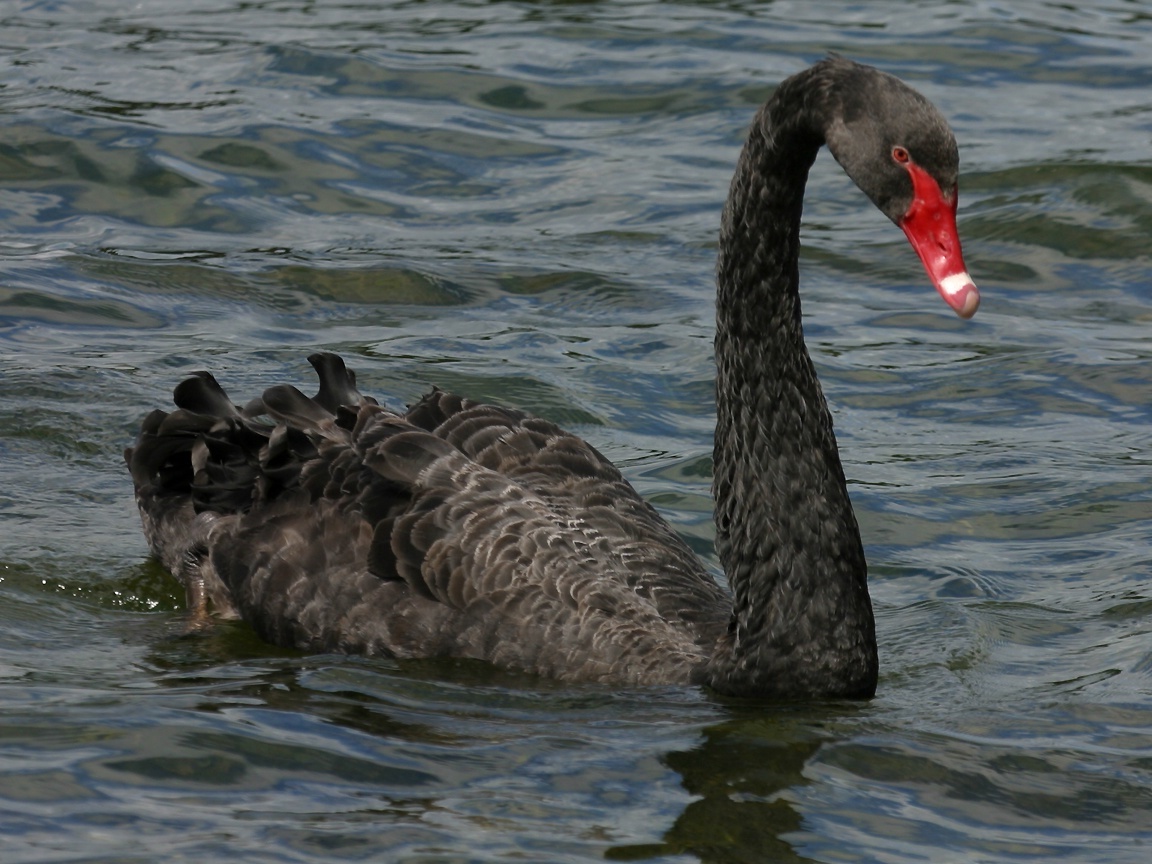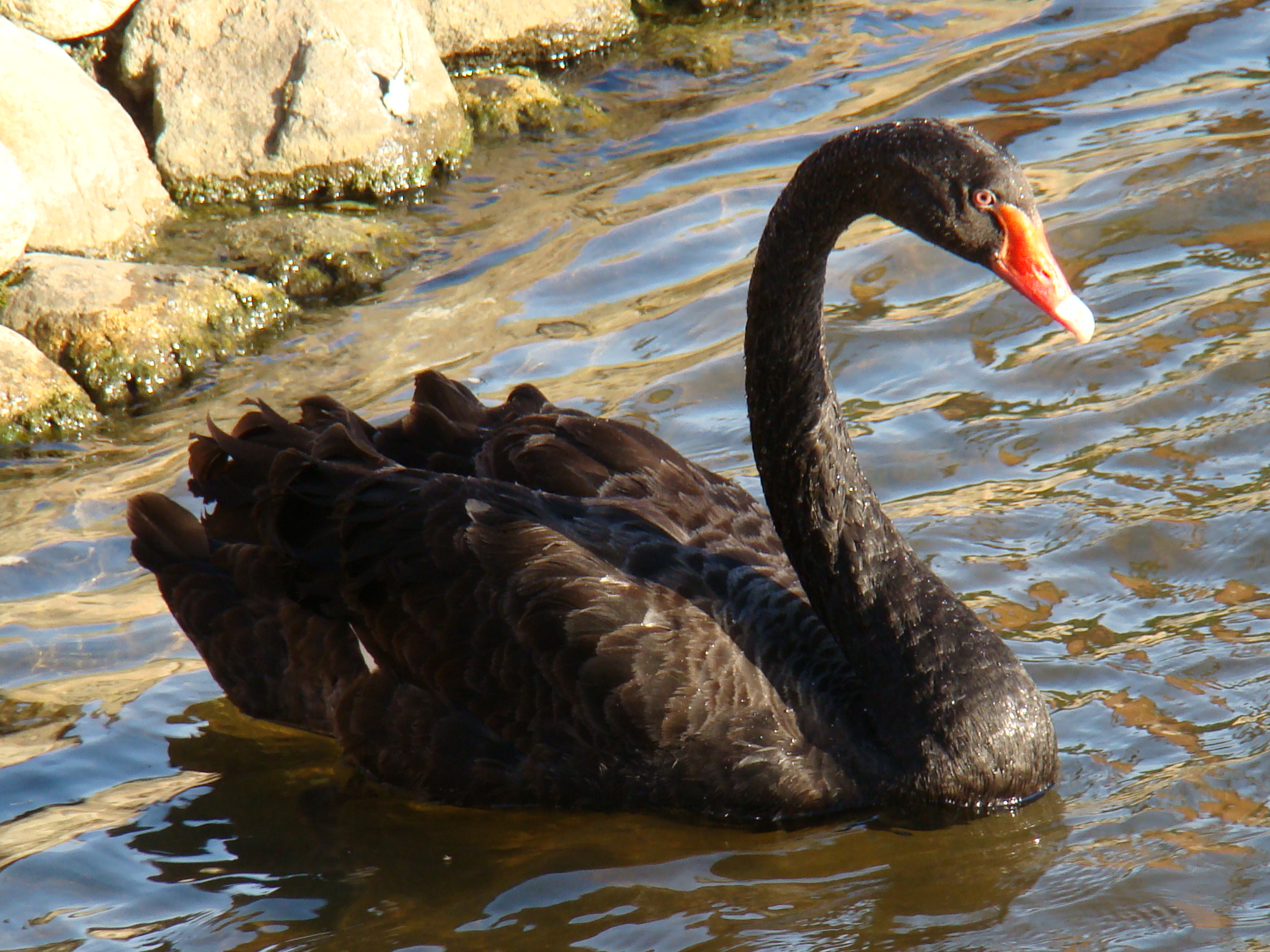The Black Swan Theory or Theory of Black Swan Events is a metaphor that encapsulates the concept that The event is a surprise (to the observer) and has a major impact. After the fact, the event is rationalized by hindsight.
The theory was developed by Nassim Nicholas Taleb to explain:
1. The disproportionate role of high-impact, hard to predict, and rare events that are beyond the realm of normal expectations in history, science, finance and technology
2. The non-computability of the probability of the consequential rare events using scientific methods (owing to the very nature of small probabilities)
3. The psychological biases that make people individually and collectively blind to uncertainty and unaware of the massive role of the rare event in historical affairs
Unlike the earlier philosophical "black swan problem", the "Black Swan Theory" (capitalized) refers only to unexpected events of large magnitude and consequence and their dominant role in history. Such events, considered extreme outliers, collectively play vastly larger roles than regular occurrences.* 1 Background
* 2 Identifying a black swan event
* 3 Coping with black swan events
* 4 Epistemological approach
* 5 See also
o 5.1 Books by Taleb
* 6 References
* 7 External links
lack Swan Events were characterized by Nassim Nicholas Taleb in his 2007 book (revised and completed in 2010), The Black Swan. Taleb regards almost all major scientific discoveries, historical events, and artistic accomplishments as "black swans"—undirected and unpredicted. He gives the rise of the Internet, the personal computer, World War I, and the September 11 attacks as examples of Black Swan Events.
The term black swan was a Latin expression—its oldest known reference comes from the poet Juvenal's characterization of something being "rara avis in terris nigroque simillima cygno" (6.165).[1] In English, this Latin phrase means "a rare bird in the lands, and very like a black swan." When the phrase was coined, the black swan was presumed not to exist. The importance of the simile lies in its analogy to the fragility of any system of thought. A set of conclusions is potentially undone once any of its fundamental postulates is disproved. In this case, the observation of a single black swan would be the undoing of the phrase's underlying logic, as well as any reasoning that followed from that underlying logic.
Juvenal's phrase was a common expression in 16th century London as a statement of impossibility. The London expression derives from the Old World presumption that all swans must be white because all historical records of swans reported that they had white feathers.[2] In that context, a black swan was impossible or at least nonexistent. After a Dutch expedition led by explorer Willem de Vlamingh on the Swan River in 1697, discovered black swans in Western Australia[3], the term metamorphosed to connote that a perceived impossibility might later be disproven. Taleb notes that in the 19th century John Stuart Mill used the black swan logical fallacy as a new term to identify falsification.
Specifically, Taleb asserts[4] in the New York Times:What we call here a Black Swan (and capitalize it) is an event with the following three attributes. First, it is an outlier, as it lies outside the realm of regular expectations, because nothing in the past can convincingly point to its possibility. Second, it carries an extreme impact. Third, in spite of its outlier status, human nature makes us concoct explanations for its occurrence after the fact, making it explainable and predictable.
I stop and summarize the triplet: rarity, extreme impact, and retrospective (though not prospective) predictability. A small number of Black Swans explains almost everything in our world, from the success of ideas and religions, to the dynamics of historical events, to elements of our own personal lives.The main idea in Taleb's book is to not attempt to predict Black Swan Events, but to build robustness against negative ones that occur and be able to exploit positive ones. Taleb contends that banks and trading firms are very vulnerable to hazardous Black Swan Events and are exposed to losses beyond that predicted by their defective models.Based on the author's criteria:
1. The event is a surprise (to the observer).
2. The event has a major impact.
3. After its first recording, the event is rationalized by hindsight, as if it could have been expected (e.g., the relevant data were available but not accounted for).
In the second edition of The Black Swan, Taleb provides "Ten Principles for a Black-Swan-Robust Society".
Taleb states that a Black Swan Event depends on the observer. For example, what may be a Black Swan surprise for a turkey is not a Black Swan surprise to its butcher; hence the objective should be to "avoid being the turkey" by identifying areas of vulnerability in order to "turn the Black Swans white".
Taleb's black swan is different from the earlier philosophical versions of the problem, specifically in epistemology, as it concerns a phenomenon with specific empirical and statistical properties which he calls, "the fourth quadrant".[5]
Taleb's problem is about epistemic limitations in some parts of the areas covered in decision making. These limitations are twofold: philosophical (mathematical) and empirical (human known epistemic biases). The philosophical problem is about the decrease in knowledge when it comes to rare events as these are not visible in past samples and therefore require a strong a priori, or what one can call an extrapolating theory; accordingly events depend more and more on theories when their probability is small. In the fourth quadrant, knowledge is both uncertain and consequences are large, requiring more robustness.
Before Taleb,[6] those who dealt with the notion of the improbable, such as Hume, Mill, and Popper focused on the problem of induction in logic, specifically, that of drawing general conclusions from specific observations. Taleb's Black Swan Event has a central and unique attribute, high impact. His claim is that almost all consequential events in history come from the unexpected—yet humans later convince themselves that these events are explainable in hindsight (bias).
One problem, labeled the ludic fallacy by Taleb, is the belief that the unstructured randomness found in life resembles the structured randomness found in games. This stems from the assumption that the unexpected may be predicted by extrapolating from variations in statistics based on past observations, especially when these statistics are presumed to represent samples from a bell-shaped curve. These concerns often are highly relevant in financial markets, where major players use value at risk models, which imply normal distributions, although market returns typically have fat tail distributions.More generally, decision theory, based on a fixed universe or a model of possible outcomes, ignores and minimizes the effect of events that are "outside model". For instance, a simple model of daily stock market returns may include extreme moves such as Black Monday (1987), but might not model the breakdown of markets following the September 11 attacks of 2001. A fixed model considers the "known unknowns", but ignores the "unknown unknowns".Taleb notes that other distributions are not usable with precision, but often are more descriptive, such as the fractal, power law, or scalable distributions and that awareness of these might help to temper expectations.
Beyond this, he emphasizes that many events simply are without precedent, undercutting the basis of this type of reasoning altogether.Taleb also argues for the use of counterfactual reasoning when considering risk black swan
black swan black swan
black swan black swan
black swan black swan
black swan black swan
black swan black swan
black swan black swan
black swan black swan
black swan black swan
black swan black swan
black swan black swan
black swan black swan
black swan black swan
black swan
black swan
Black Swan best pics 2009 top places You On Here » Black Swan best pics 2009 top places
|
|
|---|

Blog Archive
-
▼
2011
(199)
-
▼
February
(69)
- Ukraine Journey Starts from Luton Airport
- Ukraine Journey
- Cricket World Cup 2011 Grounds Asia
- CUBA: Dr.Oscar Elias Biscet - Nobel Peace Prize
- Zoé Valdés: El turno es para los de adentro .
- Black Swan best pics 2009 top places
- CRISIS INSTITUCIONAL EN EL URUGUAY
- Les presento a esta preciosa damita de 22, mi amig...
- PRESO POLÍTICO CUBANO SE NIEGA A SALIR DE LA CÁRCEL
- GUIDO SIGLER AMAYA ES RECIBIDO CALUROSAMENTE EN SU...
- VIDEO: Cenotes — Mexico's Subterranean Paradise
- Festejos en El Cairo tras salida de Hosni Mubarak
- Patricio De La Guardia mató a Allende por orden de...
- Shanghai Airports - A complete guide
- TSA Homosexual Molestation
- EL PARTO DE PENELOPE Y JAVIER BARDEM, VAYA PAR DE ...
- El Cristo Nazareno
- El Angel de la Abundancia
- Brazos delgados, cintura estrecha, rostro agradabl...
- Top 5 Most Dangerous Cities for live of the World
- Respuesta de Pedro Sevcec a los miserables castris...
- Reagan frente al tirano Castro, la misma estafa......
- YOANI SANCHEZ LE ESTA GANANDO LA BATALLA AL CASTRI...
- Cool Ways to Say "Cool" in Spanish
- ¡A consumir para salvar la tirania de los Castro!
- Finaliza el caso de Chris Walter Johnson
- Funciones y operaciones de los bancos
- UNICAMENTE LA JUSTICIA RETRIBUTIVA PODRÁ DEVOLVER ...
- Tired of Coach? Fly Around the World by Private Jet
- Por qué nadie protesta en La Habana
- Los Bush, Miliciano Perez, su neoarrimada y la com...
- El tirano Castro, el HP.
- El tirano Castro aconseja a Mubarak
- Video delata temor de la tirania castrista a internet
- EEUU discute con Egipto plan para la dimisión inme...
- Goldman Sachs was top Obama donor
- Elaine, una de mis amigas de fb.
- Israel OKs US ‘Gift’ of Billions of Dollars in War...
- Israeli made partner at Goldman Sachs
- Goldman Sachs pay out $111million in bonuses despi...
- The Top 5 Reasons to Visit Cordoba, Argentina
- No sólo la indolencia sino también la complicidad ...
- K- Artículos (Articles) (46). Español, English, Fr...
- J- Artículos (Articles) (28). Español, English, Fr...
- I- Artículos (Articles) (34). Español, English, Fr...
- H- Artículos (Articles) (30). Español, English, Fr...
- G- Artículos (Articles) (27). Español, English, Fr...
- F- Artículos (Articles) (20). Español, English, Fr...
- A- Artículos, Documentos (Articles, Documents) (22...
- E- Artículos (Articles) (29). Español, English, Fr...
- D- Artículos (Articles) (20). Español, English, Fr...
- C- Artículos (Articles) (25)
- B- Artículos (Articles) de (by) Dr. Octavio Dilewi...
- Ciudades. Cities. Villes
- Plusieurs essais et des nouvelles
- Diverse analyses and news
- Análisis diversos y noticias
- ESPAÑOL, ENGLISH, FRANÇAIS
- ENCAUSEMOS A LOS CASTRO Y SU GANGA. UNÁMONOS A LA ...
- Serie: bella y sexy, una de mis amigas de fb
- Temas Cubanos. Cuban Themes. Thèmes cubains
- Música, artes escénicas. Music, performing arts. M...
- La caida del penco; tremendo papelazo y, nunca hub...
- Les presento a esta bella dama, mi nueva amiga Yen...
- Did The Fed Just (Surreptitiously) Bail Out Europe?
- Why Is The Fed Actively Managing A $25 Billion Mai...
- Geithner: Pickpocketing Trillions from the People ...
- Access to fed Money - One of few naked Short Selle...
- Gearing Up for the 4th Annual Whale Shark Festival...
-
▼
February
(69)